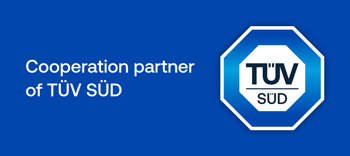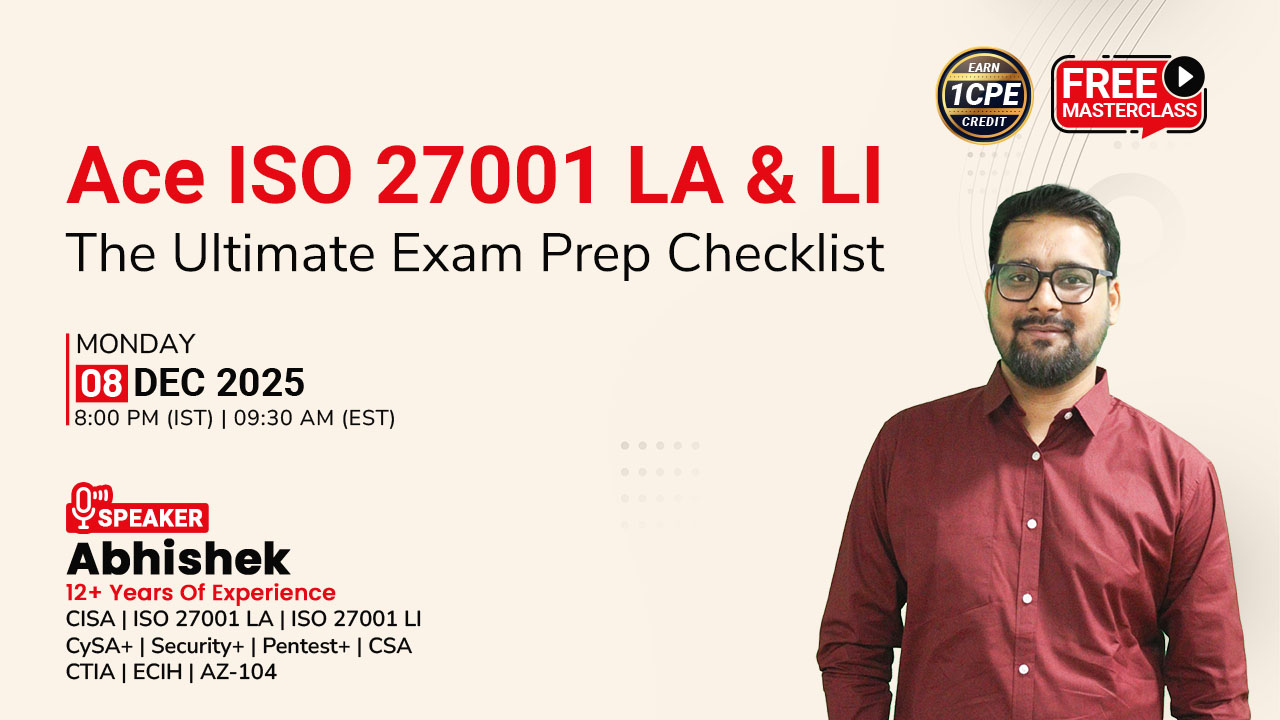Program Highlights
Any management system’s success depends on effective auditing. As a result, it encompasses a great deal of responsibility, difficulty, and complexity. The participants in this five-day intensive course are prepared for the ISO 27001 qualification process.
40-Hour LIVE Instructor-led Training
Practical Approach for ISO 27001 Audit
Mock Test and Exam Guidance Session
Highly Interactive and Dynamic Sessions
Telegram Support Group for Exam Practice
Learn from Industry Experts
Authorized Training Partner
Extended Post Training Support
Access to Recorded Sessions
Training Schedule
- upcoming classes
- corporate training
- 1 on 1 training
Looking for a customized training?
REQUEST A BATCHWhy Choose Our Corporate Training Solution
- Upskill your team on the latest tech
- Highly customized solutions
- Free Training Needs Analysis
- Skill-specific training delivery
- Secure your organizations inside-out
Why Choose 1-on-1 Training
- Get personalized attention
- Customized content
- Learn at your dedicated hour
- Instant clarification of doubt
- Guaranteed to run
Can't Find a Suitable Schedule? Talk to Our Training Advisor!

Introduction to the Information Security Management System (ISMS) and ISO/IEC 27001
Section 1: Training course objectives and structure
- General information
- Learning objectives
- Educational approach
- Examination and certification
Section 2: Standards and regulatory frameworks
- What is ISO?
- The ISO/IEC 27000 family of standards
- Advantages of ISO/IEC 27001
Section 3: Certification process
- Certification process
- Certification scheme
- Accreditation bodies
- Certification bodies
Section 4: Fundamental concepts and principles of information security
- Information and asset
- Information security
- Confidentiality, integrity, and availability
- Vulnerability, threat, and impact
- Information security risk
- Security controls and control objectives
- Classification of security controls
Section 5: Information Security Management System (ISMS)
- Definition of a management system
- Definition of ISMS
- Process approach
- ISMS implementation
- Overview – Clauses 4 to 10
- Overview – Annex A
- Statement of Applicability
Audit principles, preparation, and initiation of an audit
Section 6: Fundamental audit concepts and principles
- Audit standards
- What is an audit?
- Types of audits
- Involved parties
- Audit objectives and criteria
- Combined audit
- Principles of auditing
- Competence and evaluation of auditors
Section 7: The impact of trends and technology in auditing
- Big data
- The three V’s of big data
- The use of big data in audits
- Artificial intelligence
- Machine learning
- Cloud computing
- Auditing outsourced operations
Section 8: Evidence-based auditing
- Audit evidence
- Types of audit evidence
- Quality and reliability of audit evidence
Section 9: Risk-based auditing
- Audit approach based on risk
- Materiality and audit planning
- Reasonable assurance
Section 10: Initiation of the audit process
- The audit offer
- The audit team leader
- The audit team
- Audit feasibility
- Audit acceptance
- Establishing contact with the auditee
- The audit schedule
Section 11: Stage 1 audit
- Objectives of the stage 1 audit
- Pre on-site activities
- Preparing for on-site activities
- Conducting on-site activities
- Documenting the outputs of stage 1 audit
On-site audit activities
Section 12: Preparing for stage 2 audit
- Setting the audit objectives
- Planning the audit
- Assigning work to the audit team
- Preparing audit test plans
- Preparing documented information for the audit
Section 13: Stage 2 audit
- Conducting the opening meeting
- Collecting information
- Conducting audit tests
- Determining audit findings and nonconformity reports
- Performing a quality review
Section 14: Communication during the audit
- Behavior during on-site visits
- Communication during the audit
- Audit team meetings
- Guides and observers
- Conflict management
- Cultural aspects
- Communication with the top management
Section 15: Audit procedures
- Overview of the audit process
- Evidence collection and analysis procedures
- Interview
- Documented information review
- Observation
- Analysis
- Sampling
- Technical verification
Section 16: Creating audit test plans
- Audit test plans
- Examples of audit test plans
- Guidance for auditing an ISMS
- Corroboration
- Evaluation
- Auditing virtual activities and locations
Closing of the audit
Section 17: Drafting audit findings and nonconformity reports
- Audit findings
- Types of possible audit findings
- Documenting the audit findings
- Drafting a nonconformity report
- The principle of the benefit of the doubt
Section 18: Audit documentation and quality review
- Work documents
- Quality review
Section 19: Closing of the audit
- Determining audit conclusions
- Discussing audit conclusions
- Closing meeting
- Preparing audit report
- Distributing the audit report
- Making the certification decision
- Closing the audit
Section 20: Evaluation of action plans by the auditor
- Submission of action plans by the auditee
- Content of action plans
- Evaluation of action plans
Section 21: Beyond the initial audit
- Audit follow-up activities
- Surveillance activities
- Recertification audit
- Use of trademarks
Section 22: Managing an internal audit program
- Managing an audit program
- Role of the internal audit function
- Main internal audit services and activities
- Audit program resources
- Audit program records
- Follow up on nonconformities
- Monitoring, evaluating, reviewing, and improving an audit program
The above-mentioned content is delivered in 32 hours. In addition to this, we have added 8 hours session.
8hrs dedicated session
ISO 27001 Practical Approach
- ISO 27001 (new 93 controls) Controls to Evidence Mapping
- Practical approach on how to collect evidence while auditing with three scenarios/ case studies paragraphs
ISO 27001 Exam Prep
- Revision of course and open mic session for doubts
- Exam Prep – mock exam
- Discussion on exam questions and answers
- Discussion on different exams
How We Help You Succeed
Vision
Goal
Skill-Building
Mentoring
Direction
Support
Success

Career Transformation
Projected rise in roles in information security management
In organizations employing ISO/IEC 27001:2022 certified lead auditors
of organizations: intend to recruit ISO/IEC 27001 certified professionals, highlighting the critical need for expertise in information security standards.
of organizations are investing in training staff on ISO/IEC 27001:2022 to enhance security management capabilities and compliance effectiveness.
Technology
Healthcare
Retail
Government
Manufacturing
Finance


Our Expert Course Advisors

12+ Years Of Experience

25+ Years of Experience
Words Have Power

Both the training advisor and the instructor were prompt in addressing questions and clarifying doubts throughout the course. The training provided an in-depth understanding of ISO 27001 auditing from an auditor’s perspective, offering valuable knowledge that will benefit both my organization and my personal growth.

The ISO 27001 Lead Auditor course was an excellent learning experience. The instructor was insightful, empathetic, and dedicated to helping us achieve our goals. His ability to explain complex topics in a relatable way made the training engaging and effective.

Excellently run training, very impressive. The trainer was extremely thorough and knowledgeable. He explained all queries deeply and did not rush anything. It was ensured that everyone full understood the concepts. I highly recommend Infosec Train.

Thank you, Abhishek, for providing excellent ISO 27001 LA coaching. All sessions that I attended were interactive and easy to understand. Also, thanks to the support team for their prompt reply to queries. Thank you, InfosecTrain team.

The training was good and the concepts are very well explained.

The trainer has taken every effort in conveying all knowledge related to ISO 27001. I have been able to understand concepts based on his teaching methods. The classes were interactive and any queries raised were duly answered with explanations. Overall, I enjoyed the past few weeks if the course. Thanks to the Infosec team.
Success Speaks Volumes
Get a Sample Certificate

Frequently Asked Questions
How to Prepare for ISO/IEC 27001:2022?
Preparing for ISO/IEC 27001:2022 requires careful planning and implementation of information security management practices. These are some preparatory measures:
- Familiarize yourself with the requirements and changes in ISO/IEC 27001:2022 by reading the standard thoroughly.
- Conduct internal audits to evaluate the efficacy of your organization's ISMS in meeting ISO/IEC 27001:2022 requirements.
- Create a detailed plan to address the gaps identified in the assessment.
- Review and update your organization's policies, procedures, and documentation to align with the requirements of ISO/IEC 27001:2022.
- Provide training to all employees involved in the ISMS to ensure they understand the updated requirements and their roles and responsibilities in implementing and maintaining the ISMS.
- Perform internal audits to assess the effectiveness of your organization's ISMS in meeting the requirements of ISO/IEC 27001:2022.
- Select a reputable certification body and schedule an external audit to obtain certification to ISO/IEC 27001:2022.
- Implement a process of continuous monitoring and improvement to ensure that your organization's ISMS remains effective in managing information security risks.
- After obtaining certification to ISO/IEC 27001:2022, continue to maintain compliance with the standard by conducting periodic internal audits, addressing non-conformities, and keeping up-to-date with any further updates or changes to the standard.
What are the ISO 27001 and 27002 standards and how are they different?
ISO 27001 and ISO 27002 are international standards for establishing, implementing, maintaining, and constantly upgrading an Information Security Management System (ISMS) in a business.
- ISO 27001: ISO 27001 is an international standard that outlines the necessary steps for managing sensitive enterprise information securely. It provides a risk-based approach for establishing, implementing, operating, monitoring, reviewing, maintaining, and improving an organization's information security management system.
- ISO 27002: Code of Practice for Information Security Controls is a supporting standard to ISO 27001 that provides guidelines and best practices for selecting, implementing, and managing information security controls within the framework of an ISMS.
What was changed in the newly published ISO 27002:2022?
The updated version of the internationally recognized standard ISO/IEC 27001 has been published with a more relevant and up-to-date title: ISO/IEC 27001:2022 Information Security, Cybersecurity, and Privacy Protection. This revised edition addresses the evolving security challenges organizations face worldwide and focuses on protecting information assets' confidentiality, availability, and integrity.
What are the benefits of doing an updated ISO 27001:2022 Lead Auditor certification?
The updated ISO/IEC 27001:2022 Lead Auditor certification can offer several benefits, including:
- The candidates will gain in-depth knowledge of the latest version of the ISO/IEC 27001 standard, including any changes or updates introduced in the 2022 edition.
- The candidates will have a globally recognized credential demonstrating their expertise in auditing information security management systems.
- It can open up new career opportunities in information security auditing.
- It will equip the candidates to help organizations achieve and maintain compliance with the latest standard version, enhancing their information security posture.
- It will teach the candidates new auditing techniques, tools, and best practices to improve auditing skills.
What is the ISO 27001:2022 Lead Auditor certification?
The ISO 27001:2022 Lead Auditor certification validates an individual's knowledge and expertise in auditing Information Security Management Systems (ISMS) based on the ISO/IEC 27001:2022 standard. It demonstrates that the individual has met the required competency criteria and possesses the necessary skills to conduct an ISMS audit.
What are the key topics covered in ISO 27001:2022 Lead Auditor certification program?
The exam covers the following competency domains:
- Fundamental Principles and Concepts of Information Security Management System (ISMS)
- Information Security Management System (ISMS)
- Fundamental Audit Concepts and Principles
- Preparation of an ISO/IEC 27001 Audit
- Conducting an ISO/IEC 27001 Audit
- Closing an ISO/IEC 27001 Audit
- Managing an ISO/IEC 27001 Audit Program





